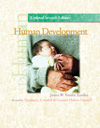 |  Human Development: Updated, 7/e James Vander Zanden,
Ohio State University
Thomas Crandell,
Broome Community College
Corinne Crandell,
Broome Community College
Introduction
Chapter OutlineChapter 1 offers an overview of the developmental perspective, outlines basic concepts, and identifies various research methods. Several important topics are presented:
1The four primary concerns of developmental psychologists. We will look at how psychologists try to describe, explain, predict, and control development. |
 |  |  | 2Frameworks for organizing information about human development. We will examine human development from the standpoints of major domains, processes, context, and timing. |
 |  |  | 3Urie Bronfenbrenner's ecological approach to development. This approach links the individual to social and cultural forces and shows connections between these forces and the individual. |
 |  |  | 4Cultural influences on human development. This section looks at the impact that culture has in shaping our conception of the life cycle. |
 |  |  | 5Historical "areas of concern" among developmentalists. This section highlights the critical questions of the past as well as their continuing influence on contemporary research. |
 |  |  | 6The scientific method. This section describes the scientific method and its importance for the field of development. |
 |  |  | 7Research methodology. This section presents detailed descriptions of the various approaches used by scientists to study human nature. |
 |  |  | 8Ethical considerations. A framework is presented which highlights critical aspects of conducting research on human subjects. |
|



 2003 McGraw-Hill Higher Education
2003 McGraw-Hill Higher Education